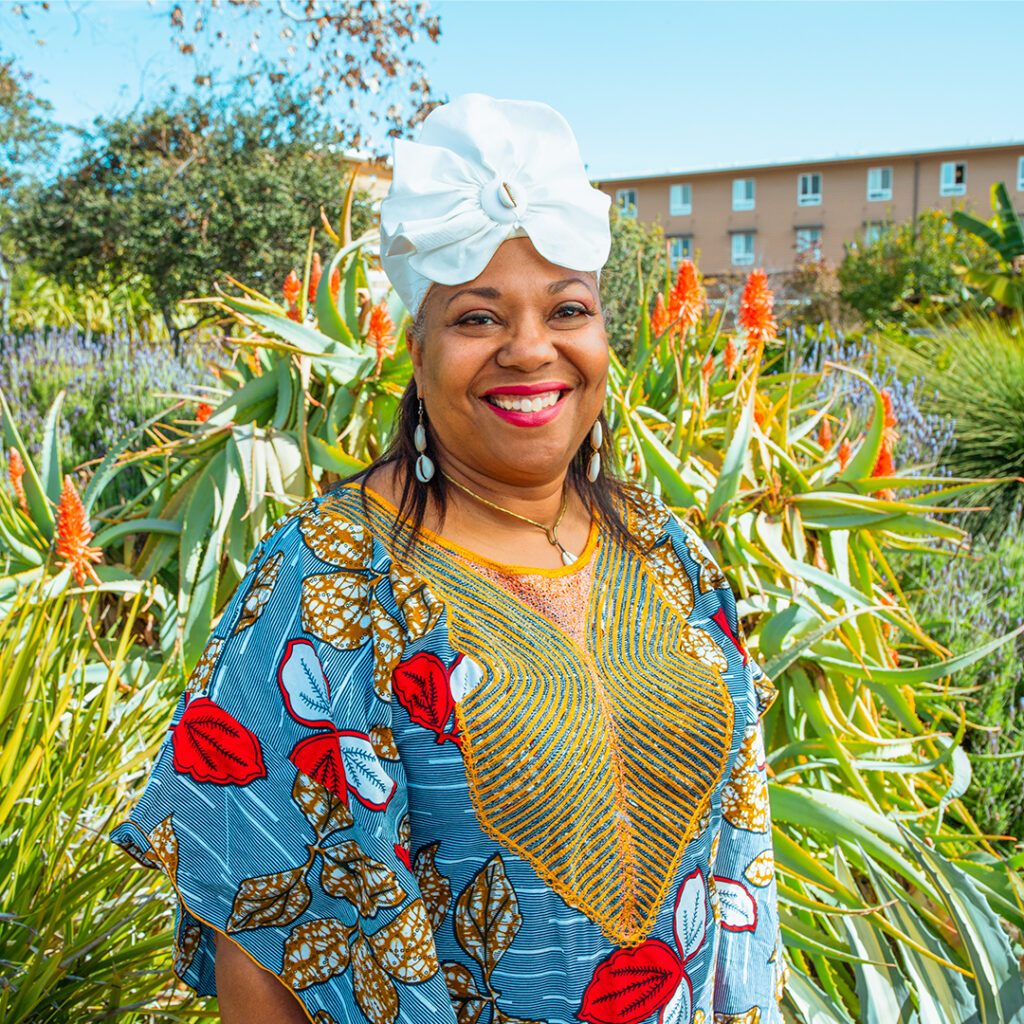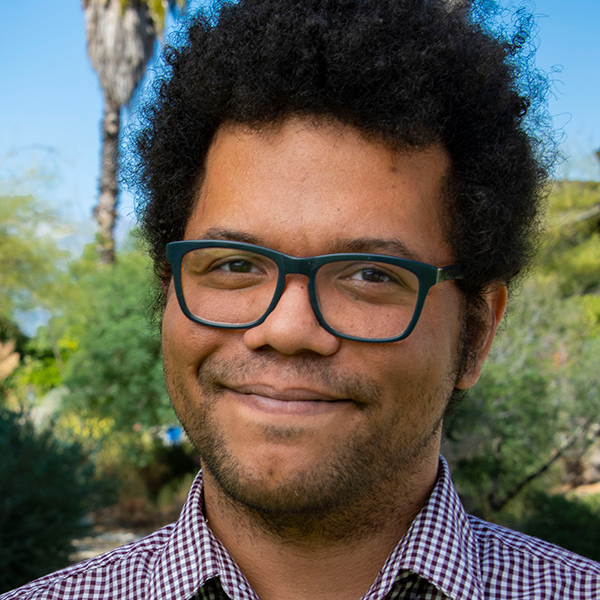Join Pitzer College as we honor and encourage the study, observance, and celebration of Black History Month. We will spotlight members of our community and share resources to learn more about the contributions and ongoing legacies of Black people in Claremont—and beyond. Features will be added throughout February.
Pitzer recognizes national history and heritage months as part of its celebration of the diversity of the College and global community. It is also committed to exploring issues related to history, culture, and identity year-round.
Check out other Heritage Months at Pitzer.
Community Spotlights

Meet Fatoumata Dioubate ’24 (she/her), a Politics, Philosophy, and Economics and French major who is studying abroad in Pitzer’s international exchange program in Nantes, France. Dioubate takes pride in her family roots in Mali in West Africa and carries her culture wherever she goes. She is also the co-president of the Black Student Union (BSU) and co-founder of Harmonyx, the first all-Black a cappella group at the 5Cs.
How did you get to where you are now?
I wouldn’t be where I am without my community’s support. Every step of the way someone told me that I could do it despite the challenges of existing as a Black person in America. I struggle with perfectionism and prioritizing my mental health when I experience burnout. When you’re someone with my background, you spend so much time trying to not only succeed but, in many ways, survive a system that was not meant for you. Checking in with yourself can sometimes fall off the back burner. However, as I have gotten older, I have become better at listening to my body when it needs a break.
In BSU, if we can meet the needs and support at least one person, that is a huge win. The challenges we face as Black students everyday are often overlooked, but as a community we do our best to make sure everyone feels seen and supported within our community.
This year, I helped start the first all-Black a cappella group, Harmonyx, to uplift Black voices and encourage Black performers to come to the a cappella world. There are many a cappella groups at the 5Cs, and I was one of five Black people still participating in them at the beginning of this semester. Every time I talked to someone in my community, they said, “Those spaces weren’t meant for me.” So, I took it upon myself to help change that. The other founders and I are still in the other groups, but Harmonyx feels like a safe space, another version of BSU, except that it is centered around music. We make a cognizant effort to showcase Black artists and Black music in turn, uplifting our own community and encouraging more students of color to participate in a capella.
Tell us about your experience as an Amplifying Black Communities programs assistant at Pitzer’s Community Engagement Center (CEC).
It was through the CEC, where I work as an Amplifying Black Communities program assistant, that I was able to create the a cappella group. I love working for the CEC because they encourage our projects, and they truly allow us to use our jobs as an avenue to help support the Black community. I work alongside BSU co-president Nejat Ali ’23 and BSU Executive Board member Ayman Omar ’24 to bring what we feel that our community needs. We also do outreach outside of BSU, such as neighboring high schools.
We went to Adelanto High and did a presentation about the types of colleges and the Common App to offer the students support on their college application process. Later, the high school students spent the day at Pitzer, where they got to meet other BSU members and ask everyone questions about college life, the application process, and more.
What does Black History Month mean to you?
Ignoring the obvious issues with society trying to have a designated month where everyone pays attention to a group of people, Black History Month is a time for celebration. The Black community is strong, resilient, full of rich culture and beautiful. We celebrate for all of those who came before us, and we prepare for all those who will come after. The Black community is celebrating our culture not just this month but every day.

Meet alumna Leeshawn Cradoc Moore ’87 (she/her), who is the director of institutional research and assessment at Pitzer College. She earned her MA and PhD at Claremont Graduate University. She served at Pitzer as an associate dean of admission and associate dean of students and was formerly director of institutional research at two other institutions.
How do your culture and family background influence your work?
My maternal and paternal grandparents were from New Orleans, Louisiana. My family is heavily influenced by the culture of the city. All my grandparents worked in service jobs. My maternal grandmother was a sharecropper. She had a saying that she picked a lot of cotton to get here. She was referring to making a better life for all her children. I took that saying to heart and honored her by earning my PhD. Few African Americans have doctorates.
Few people look like me in institutional research because few women of color and African American women are in statistical or mathematical areas. I’m purposefully doing something difficult because I want to be a leader for younger people—not only African Americans but all people.
I’m committed to Pitzer. This is an opportunity for me to tell the success stories of students of color and all graduates. We are making sure Pitzer students are succeeding, and if we’ve succeeded or fallen short, that’s the story I need to tell.
How did you get to where you are now?
My first love affair with institutional research came early in my career in higher education. Pitzer President Frank Ellsworth came to my admission office and asked how many students of color and females we had. I was also asked to find out the high school origins of students. That’s how I began with data. I left and returned to Pitzer after becoming an established institutional research leader to lend my talents to my alma mater.
One of my proudest moments at Pitzer was recruiting my mother, Fannie Cradoc ’93, to be a New Resources student. She went on to get a master’s and became a teacher for 17 years. Another proud moment was the minority program I created as the associate dean of admission. Yvonne Berumen ’97 was my minority intern and now is the vice president of admission at Pitzer.
What is your favorite part about Pitzer?
It’s a welcoming place. Students have a say here. You have strong faculty who care about teaching. There were not a lot of African American faculty when I was a student, but there were faculty like Agnes Moreland Jackson, Rudi Volti, and Jack Sullivan who were interested in my success. I was encouraged to get my bachelor’s degree in psychology and Spanish. I learned how to speak Spanish fluently from living at a home with a Mexican family, and it was life changing. Pitzer provided that opportunity to learn about Mexican culture and learn about the African descendants in Mexico.
What does Black History Month mean to you?
It is a time to reflect on the past, present, and future of African Americans. Anywhere there’s water, Africans were sent and enslaved against their will to endure horrific labor conditions. We must confront our past and look for ways to make the conditions of underserved students of African descent better.
During this month, some people say they don’t see color, but that’s the worst thing you can say to an African American woman. Most of the time African American women feel invisible. There are so few in a class or meeting. You don’t see me? You don’t cherish how I look? You will find me dressed in African clothing during Black History Month and throughout the year. I celebrate my heritage and would welcome conversations with anyone about the many accomplishments of Africans and African Americans that make this world a better place!

Meet Assistant Professor of Psychology Darin R. Brown (he/him), who has taught at Pitzer College since 2019. His recent courses include Neurobiology of Emotion, Introduction to MATLAB, and Foundations of Data Science. Brown earned his PhD from University of New Mexico and MA and BA from California State University, Los Angeles.
How do your culture and family background influence your work?
My training is in the cognitive neurosciences, where we care about neurons and cells in the brain. As I got older, I realized that these brains that I studied belong to people. And those phenomena that we examine are based on where the owner of that brain grew up and their history. I’m grateful for my culture and my Blackness because it allows me to give some insight that my field terribly lacks. On top of that, I’m adopted. I was raised in a white family. I had to seek where I belonged and who I was on my own. Those things have influenced how I conduct my research and the classes I teach.
How did you get to where you are now?
I went to Claremont High School, but I in no way matched the typical student or resident. That was challenging. I bounced around in college and jobs. I worked in a restaurant in Claremont for 13 years. I decided to take college seriously later in life because my heart got broken. Luckily, I fell in love with something else: psychology. I realized I was good at school. It was a lot of zigs and zags. Getting older allowed me to see how those zigs and zags make a straight line—when you squint at them.
What does Black History Month mean to you?
Given my background, I was a little late to the party. It’s easy to be cynical (as I was) regarding Black History Month. It’s the shortest month of the year. It’s a time when department stores and news stations highlight their interest in Blackness. As I’ve gotten older, I’ve been able to find my language to transform my anger into action and my cynicism into celebration.
I love this moment where I reflect on my and other Black people’s contributions to my community and how I’ve become more in touch and in love with my Blackness. Now that I’m a parent, I not only get to reflect on my own Blackness but on my daughter’s.
What drew you to Pitzer?
I worked at Viva Madrid for 13 years. You got to know the different colleges through how their students would treat the wait staff. We’d always argue over who could take the Pitzer tables because they were fun and interesting to talk to. I remember students asked me my opinions on things, which never happened before.
As I got through my graduate program, I started realizing the need for community engagement and social awareness, especially in my field. A lot of colleges tack on social justice. That’s not Pitzer; the foundation was social justice and community engagement. I also got to come home to Southern California and be on the other side of the curtain at the College!
To know more about Brown’s research, check out his Reward, Affect, and Decision-Making Laboratory, where he and Pitzer students investigate the neural correlates of reward processing, emotional states, and how these processes influence learning and decision-making.
Zoom Background
Celebrate Black History Month with our Zoom background.
 16: 9
16: 9
 4:3
4:3
To download: Click on the image to open a larger file, then download it to your computer.
Black History Month Events: February 2023
Office of Black Student Affairs’ Master Calendar for Black History Month
Pitzer Black Student Union’s Black History Month Calendar
The Black Experience in Design w/ Kareem Collie
Presented by the Hive and the Office of Black Student Affairs
February 1 from 7 p.m. to 8:30 p.m. at the Hive
Excluded from traditional design history and educational canons that heavily favor European modernist influences, the work and experiences of Black designers have been systematically overlooked in the profession for decades. One year ago, The Black Experience in Design: Identity, Expression & Reflection was published as the leading anthology on the topic, spotlighting over 70 Black designers, artists, curators, educators, students, and researchers, who represent a wide cross-section of Black diasporic identities and multi-disciplinary practices.
Join Kareem Collie, co-editor of The Black Experience in Design and former Hive faculty, for an evening of candid and thought-provoking conversation with peers. This is a hybrid event with pizza for in-person attendees! Everyone will be entered into a raffle to win a copy of The Black Experience in Design book!
Registration required: https://www.eventbrite.com/e/the-black-experience-in-design-w-kareem-collie-tickets-514479621397
Book Talk with Professor Rita Roberts
Presented by the Intercollegiate Department of Africana Studies
February 28 at 5:30 p.m. at the Hampton Room, Scripps College
Exhibition: Transmissions, or these histories we lest not forget
Presented by Pomona College’s Benton Museum of Art
February 8–July 23
Transmissions, or these histories we lest not forget is organized on the occasion of the Benton Museum of Art’s recent acquisition of Cauleen Smith’s film Sojourner (2018) and her works on paper Lose Your Mother: A Journey Along the Atlantic Slave Route (2019) and In the Wake: On Blackness and Being (2019). Sojourner elevates the utopian visions of jazz musician and swamini Alice Coltrane Turiyasangitananda, Shaker eldress Rebecca Cox Jackson, and the Combahee River Collective, the Black feminist lesbian socialist organization.
Learn more about the exhibition.
Claremont Resources
Office of Black Student Affairs at The Claremont Colleges
Intercollegiate Department of Africana Studies
Pitzer Black Student Union
Queer Resource Center’s Black/African American Resources
The Student Life’s “Illuminating 5C Black Legacies”
Honoring Black History Month at The Claremont Colleges Library
Additional Resources
Black History is L.A. History
Los Angeles County Library: African American and Black History Month
Los Angeles Public Library’s African American History Month Resources
Association for the Study of African American Life and History
BlackHistoryMonth.gov
National Museum of African American History and Culture